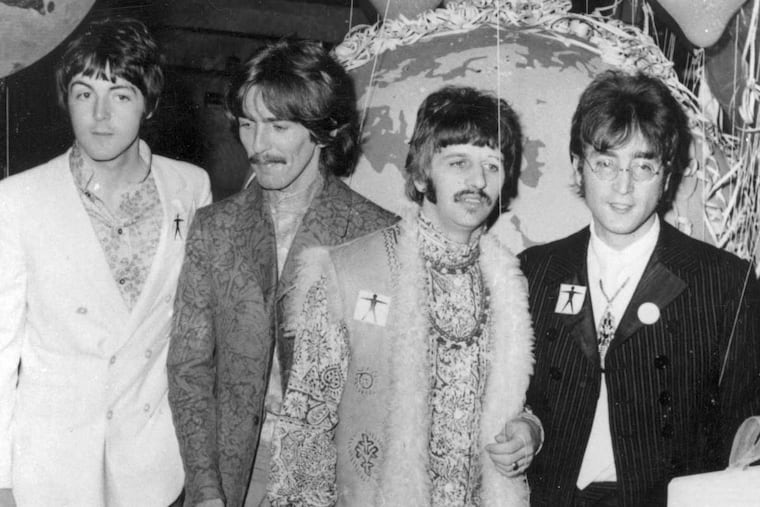With Sgt. Pepper's came a new way to view the world
Much like the Beatles, their fans were also growing up, and had choices to make about the direction of their lives.

My brothers and I owned almost every Beatles album since their debut, and I recall coming home from the Record Museum on 69th Street in Upper Darby with Sgt. Pepper's Lonely Hearts Club Band under my arm.
The album was released June 1, 1967, and my first impression was "She's Leaving Home" was the saddest song I'd ever heard, and "A Day in the Life" was one of the weirdest. Half a century later, "She's Leaving Home" is still one of the saddest songs I've listened to, though "A Day in the Life" is less weird.
With Sgt. Pepper, the Beatles were no longer boys. The group had started to show maturity with Rubber Soul and Revolver but I was too young to understand what was happening to my favorite group - or what was happening outside Upper Darby. Later, I saw this album as the band's way of looking at the world - a world of an unpopular war, of free love, of drug use - seriously.
Paul McCartney had the idea of the Beatles assuming the role of another band - Sgt. Pepper's - and playing a joke on their bygone days of pop music. It was going to be different, they decided. And it was. While the songs seem disparate at first, there is a connectivity to the material, and it is sometimes referred to as the first concept album. McCartney also said the Beach Boys' album Pet Sounds was so different that the Beatles felt compelled to offer something out of the ordinary, too.
According to Bob Spitz's biography of the band, John Lennon got the idea for one of the songs when his 4-year-old son Julian showed him a picture he drew. It featured his friend Lucy and a sky filled with diamonds. And Lennon wrote "Being for the Benefit of Mr. Kite!" after seeing a circus poster in an antique store. Much of what Lennon sings came right from the poster, including Henry the Horse.
By 1967, the world had become a much harsher place since the beginning of Beatlemania. Instead of wanting to hold your hand, the Beatles in Sgt. Pepper's said, "I'd love to turn you on," which could have meant anything from sexual ecstasy to getting high on drugs.
There was so much to this album, from its outrageous cover, with the band wearing silly, colorful costumes and surrounded by a photo collage (designed by Michael Cooper) of famous people. There was W.C. Fields and Marlon Brando, Mae West and Bob Dylan, and an actor we didn't know who starred in a cigarette commercial wearing the coolest sunglasses ever.
Another innovation: It was the first album to put lyrics in the liner notes.
When many listeners think of Sgt. Pepper's they think of "A Day in the Life" and consider it a masterpiece. Newsweek critic Jack Kroll called the song a modern counterpart to T.S. Eliot's poem The Wasteland, with its imagery of death, despair, and doubt.
But for me, it still comes down to "She's Leaving Home."
A young girl, who feels suffocated at home, steals away one morning to meet up with an older man who will show her how to have fun: the fun the 1960s offered young people, not the fun their parents offered.
Lennon voices the anguish of the parents, as he hauntingly sang, "we gave her most of our lives ... sacrificed most of our lives ... we struggled hard all our lives to get by ... fun is the one thing money can't buy."
McCartney has written some of the sappiest songs ever, yet "Yesterday" and "Eleanor Rigby" had shown he was capable of reflection. In "She's Leaving Home," he captured what became known as the generation gap. Much like the Beatles, their fans were also growing up, and had choices to make about the direction of their lives. For many, the direction did not include staying home. My brother, who plays the guitar, considers it a song of liberation, and as I grew into my teens, I could understand why she wanted to leave.
Sgt. Pepper's was nothing if not audacious in its refusal to be conformist and willingness to take risks. Fifty years later, the album challenges its listeners to see the world - any world - seriously. Just as the daughter of "She's Leaving Home" is being serious and taking risks, possibly for the first time in her life.
Jon Caroulis is a writer in Jenkintown. jon.caroulis@gmail.com